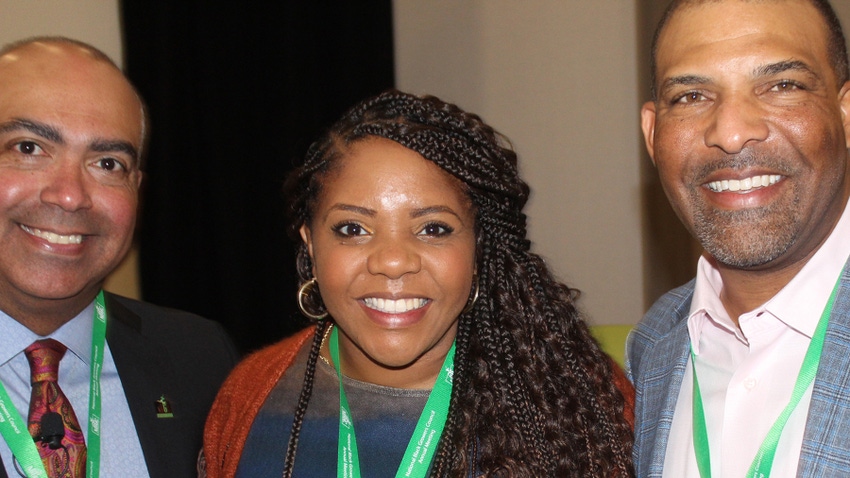January 10, 2024

“NB!” “GC!” “NB!” “GC!” “NB!” “GC!”
Each time moderator A.J. Sabine repeated the letters “NB,” the audience of more than 500 responded with “GC” even louder as the annual meeting of the National Black Growers Council got underway in Memphis, Tenn, on Dec. 13.
Black farmers, ranchers and their allies in agriculture and industry came together at the Memphis Sheraton to gather information, share experiences and celebrate a comeback after years of dwindling numbers and loss of land by minority producers.
“This annual meeting signifies not only a gathering of like-minded individuals, but a testament to our unwavering commitment to the advancement and empowerment of Black farmers across our great nation,” said Phillip “P.J.” Haynie, chairman of the National Black Growers Council and a fifth-generation farmer from Burgess, Va.
“Your presence here today is a symbol of your dedication and the impact that we have as a collective on the agricultural industry and our community,” said Haynie, who is also a partner in the only Black-owned rice mill in the U.S., located in Pine Bluff, Ark.
Haynie welcomed Agriculture Secretary Tom Vilsack, who had spent most of the previous week meeting with officials from other countries at the United Nations Conference of the Parties or COP28 meeting on climate change in Dubai.
“When I say the secretary just got back from Dubai, he really just got back from Dubai,” said Dewayne Goldman, senior advisor for racial justice and equity at USDA, who moderated the session. “But he felt this meeting was important enough for him to be here.”
Examining the future
Vilsack talked about the future of American agriculture and the situation Black growers find themselves in.
“I don’t want you to think I don’t understand or appreciate in some small way the incredible challenges you all have faced and continue to face. But we at USDA are committed to an effort to write a different story for the department and for Black growers.”
He also urged Congress to not “significantly underfund the important work of USDA” as it continues to negotiate a new federal budget as a continuing resolution keeping the government open is scheduled to expire on Jan. 19 and Feb. 2.
Homer Wilkes, USDA’s undersecretary for Natural Resources and the Environment; Robert Bonnie, undersecretary for farm production and conservation; Terry Crosby, chief of USDA’s Natural Resources and Conservation Service; Roddric Bell, regional director of USDA’s Risk Management Agency; and Zach Ducheneaux, administrator of USDA’s Farm Service Agency, also spoke at the meeting.
Empowering Black Farmers
Haynie said the National Black Growers Council has come a long way since it was organized in 2010. (Some of its members began meeting in 2006 to discuss issues that could prevent Black farmers from staying in business.)
“Over the years our organization has played a pivotal role in promoting opportunities and supporting aspirations of Black farmers,” he said. “Through our tireless efforts, we have fostered growth, resilience and a renewed sense of pride within our community. Today, we not only gather to celebrate our achievements, but also embrace the infinite possibilities that lie before us.”
Empowering our black farmers is at the forefront of the NBGC’s agenda for Black growers, he noted. “We are determined to equip them with the knowledge, skills and resources, not just to survive, but to thrive in an ever-changing landscape. It is imperative that we invest in our comprehensive training programs that address the specific needs of black farmers from sustainable farming practices to financial literacy and business management.
“Additionally, access to capital remains a critical factor in the success of our farmers, and we will work tirelessly to ensure the necessary funding and resources are available to support their endeavors.”
The National Black Growers Council conducted six Model Farm Series field days around the country with more than a thousand attendees in 2023, he noted. The Council was also the recipient of a USDA Climate Smart Agriculture grant for a pilot project on regenerative agriculture.
“Our hard work has seen an increase in partnerships, grants, and growth in our number of sustaining members. Our vision of empowerment, innovation, and collaboration will guide our actions moving forward. We will not waiver in our pursuit of a future that is equitable, inclusive, resilient, and prosperous for all Black farmers.”
About the Author(s)
You May Also Like






